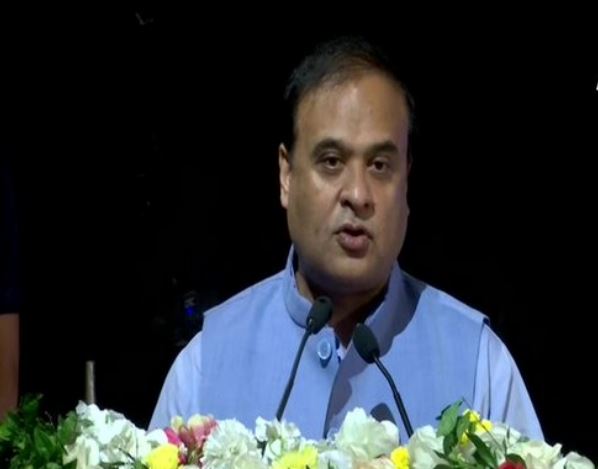Guwahati: Assam Chief Minister Himanta Biswa Sarma on Saturday said that Central Government has approved Rs 9,000 crore for the betterment of judicial infrastructure in the country and Assam would receive around Rs 300 crore as its share.
While addressing at Diamond Jubilee Celebration of the Bar Council of northeast states in Guwahati, Sarma said, “The Centre has approved Rs 9,000 crore for the improvement of judicial infrastructure and Assam would receive around Rs 300 crore as its share. In addition to that, the state government will provide another Rs 300 crore in this regard.”
He further said that the Assam government would create around 100 new positions in the lower judiciary.
“Around 100 new positions would be created in the lower judiciary by the Assam government as a step towards faster dispensation of justice in the state,” he added.
Sarma was the Guest of Honour in the Diamond Jubilee Celebration of the Bar Council of Assam, Nagaland, Mizoram, Arunachal Pradesh and Sikkim at ITA Cultural Complex, Machkhowa in Guwahati.
The Chief Minister also stated that the state government is contemplating various welfare schemes for those who retire from active practicing.
He also pointed out the need to expedite the justice delivery mechanism.
He said many people, despite being victims of circumstances, hesitate to seek legal help, as chasing justice often becomes an expensive affair, owing to the long process involved with it.
“I call upon the office bearers of the Bar Council to find out as to how it can play its role to help the weak and underprivileged,” he appealed.
The Chief Minister, speaking on the history of the country’s judicial system, lauded it for providing a robust foundation for the country’s democracy.
Sarma hailed the judiciary for upholding the rule of law and ensuring that the fundamental rights and freedoms of the citizens of this country remained intact.
“The judiciary has always played a key role in upholding the rule of law and maintaining the fine balance of power among the four pillars of our democracy. This has ensured the fundamental rights and freedoms of the citizens of this country remained intact,” the Chief Minister added.
Sarma also heaped praises on the judiciary for protecting the rights of Indian women, while at the same time upholding their dignity through landmark judgments on subjects like triple talaq, daughter’s right to property, etc.
Terming the judiciary, a great arbitrator, he said the landmark judgment in the Ram Janambhoomi case in 2019 addressed the claims of all stakeholders and settled this long-standing issue in the most remarkable and amicable manner.
The Chief Minister lauded the Indian judiciary for strengthening the country’s legal and constitutional framework, which he said emanated from the numerous landmark judgments passed by it. It has earned a global distinction as Judiciary with a difference that seeks to build a progressive jurisprudence, he added.
The Chief Minister exuded confidence the judicial institutions would always remain a sentinel of justice and a guiding force of the world’s largest functional democracy.
Chief Minister Sarma also referred to the judiciary as the saviour of Indian democracy, stating that its landmark judgments on subjects such as “basic structure”, among others, saved the Constitution from losing its spirit.
He lauded the Bar Council for activities such as orientation programmes for advocates, steps towards digitization of records, etc.
The Chief Minister heaped praises on the Bar Council for its performance of regulatory functions, raising the standard of practice in the profession of legal service.
Speaking on the long and illustrious history of the country’s judicial system, he lauded it for providing a robust foundation to the country’s democracy.
“Our judiciary has not confined its powers in dispensing justice alone, he said, while adding “This hallowed institution has been a major catalyst in empowering our citizens to be well informed about their rights and also upholding them through its pronouncements.”
Referring to the Vedas, the Upanishads and other ancient texts, the Chief Minister touched upon the subject of the rich tradition of law in the country since times immemorial.
He credited the practitioners from various philosophical schools in ancient India for law/justice attaining a prominent position in the ancient period.
“No doubt the modern Indian Judiciary is partly a continuation of the British Raj legal system,” he said.
“However, one fact still holds ground that from time immemorial, our country had a well-developed system of administration of justice,” the Chief Minister stated, adding: “The ancient Indian law was based on Principle of Dharma or Nyay that talked about the principle of Natural Justice. It is the same principle that continues to govern our judicial system even today.”
Referring to the lawyers as one of the most important components of our judicial system, the Chief Minister termed them a bridge that connects the judicial system with the people seeking justice.
“If the court is a temple of justice and then lawyers play the role of priests in this temple of justice,” he said.
Appealing to the advocates to be icons of dedication, honesty and kindness, Sarma requested them to hone their professional skills so as to advance themselves strongly in the workplace.
Coinciding with the celebration, a national seminar on the subject “Role of Technology in Facilitating Speedy Justice” was also held.
Addressing those present, which included the Union Minister of Law & Justice Kiren Rijiju, Judges of the Supreme Court Surya Kant, Hrishikesh Roy, Sudhanshu Dhulia, the Chief Justice of Guwahati High Court RM Chhaya, the Chief Minister congratulated the Bar Council for having successfully completed 60 years of glorious existence.
Earlier in the day, Union Law and Justice Minister Kiren Rijiju inaugurated the Gauhati High Court Museum, built at the old block of the Guwahati High Court premises in the presence of the Chief Minister.





